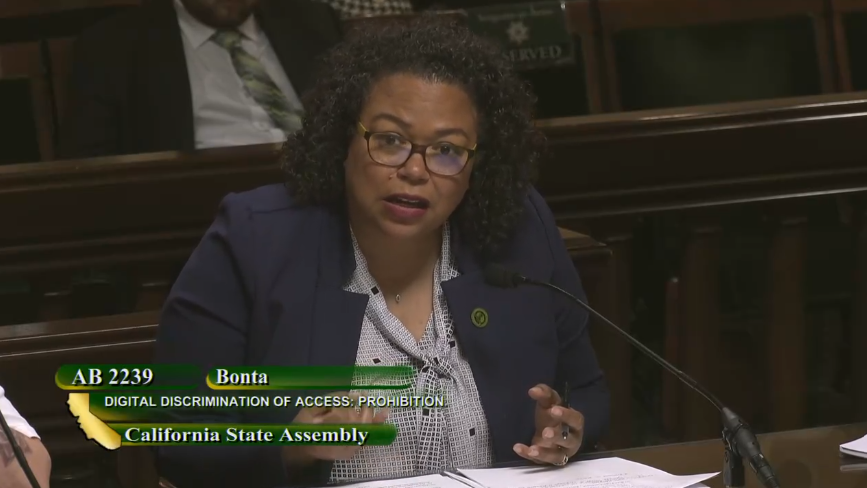California Digital Discrimination Bill Moves Out of Committee
The bill to codify in state law the federal definition of digital discrimination advanced along partisan lines.
Jericho Casper

April 15, 2024 – A bill that would make California the first state to establish measures to prevent and remedy digital discrimination practices advanced Wednesday out of committee where it had stalled for weeks.
AB 2239 advanced along partisan lines by a vote of 7-3, with one member abstaining. The proposed legislation in California aims to categorize "digital discrimination of access" as any policy or action that unfairly affects a consumer's access to broadband internet services based on factors such as income, race, ethnicity, color, religion, or national origin, without valid technical or economic justifications.
The legislation now moves to the Assembly Appropriations Committee for consideration and is expected to be heard in May 2024.
The bill, which would codify in state law the federal definition of digital discrimination, encountered opposition at an Assembly Communications and Conveyance Committee hearing from representatives of cable companies affiliated with the California Broadband and Video Association (CalBroadband), small rural telecommunications companies within the California Communications Association (CalCom), and cell tower operators represented by the Wireless Infrastructure Association.
Amanda Gualderama, legislative director of CalBroadband, expressed concerns that the proposed legislation could have a “chilling effect “ on the industry’s growth, upgrades and innovation. She also highlighted the possibility of preemption conflicts with the Federal Communications Commission's digital discrimination rules, currently under review in federal court.
Representing CalCom, Pam Loomis argued that the bill could expose small rural telcos to costly legal litigation, which may lead to higher costs of doing business that could ultimately be passed on to consumers.
Republican Assemblymember Laurie Davis said she may consider supporting the bill if it includes a safe harbor provision, which could shield companies from legal repercussions if they can demonstrate their decisions were not discriminatory in intent.
Gualderama echoed this sentiment, noting that the bill lacks procedural protections common in other state anti-discrimination laws. She did mention that the bill is set to be amended further to include such provisions, adding that CalBroadband looks forward to continuing discussions regarding the inclusion of such safeguards.
Democratic Assemblymember Stephanie Nguyen declined to vote until the bill's language is final, expressing fear that the bill would “open it up for anybody to claim discrimination when really, there clearly isn't.” She illustrated her point with an example of a provider offering a promotional rate in a new service area, while not extending it to the adjacent neighborhood that has been served for a while.
Two Democrats who voted to push the bill forward Wednesday indicated they might switch to a “no” vote when the bill comes to the assembly floor. Brian Maienschein and Freddie Rodriguez urged the bill's sponsor, assemblymember Mia Bonta, D-District 18, to continue to collaborate with opponents from the telecom industry.
At a press conference held April 4, Broadband Breakfast asked Bonta how she responds to criticisms of the bill, to which she replied, “We will meet the opposition with truth and evidence.
“We're going to address that criticism by bringing the voices of our community members who have experienced the lack of access and make sure that their righteous voice is heard throughout the state of California,” Bonta who represents California's 18th District in Oakland added.
“We already have laws on the books to very clearly say that we won't allow for disparate impact and discrimination in the areas of employment, education, healthcare,” she continued. “What we don't have right now is a firm stance from the state of California around ensuring that there is no discrimination of access as it relates to the essential service of broadband and connectivity.”
Testifying in support of the bill Wednesday were Patrick Messac, director of #OaklandUndivided, and Shayna Englin, director of the digital equity initiative at the California Community Foundation.
Messac said #OaklandUndivided partnered with HubbleIQ to run nearly half a million speed tests at over 15,000 locations across Oakland. They found that over 75 percent of internet connections tested never reached the speed threshold to be considered served.
“Most alarmingly, connections in the highest income community with the largest proportion of white residents were nearly 10 times faster than in our poorest with the city's largest population of people of color,” a pattern Messac said mirrored redlining maps from 1937.
“In Los Angeles, we have documented that the advertised cost of internet service is systematically higher in neighborhoods with higher poverty rates,” Englin said.
She provided an example: in a predominantly white neighborhood with near non-existent poverty and nearly universal connectivity the price for monthly internet service from the monopoly provider was $10 to $20 per month lower, compared to the exact same service advertised in a community 15 minutes away – where 65 percent of households live in poverty, the majority of residents are people of color, and four out of 10 people are disconnected.
Twenty-eight representatives of digital equity, education and community organizations across the state lined up to voice their support during the committee hearing, including representatives of the California Emerging Technology Fund and the Electronic Frontier Foundation.









Member discussion